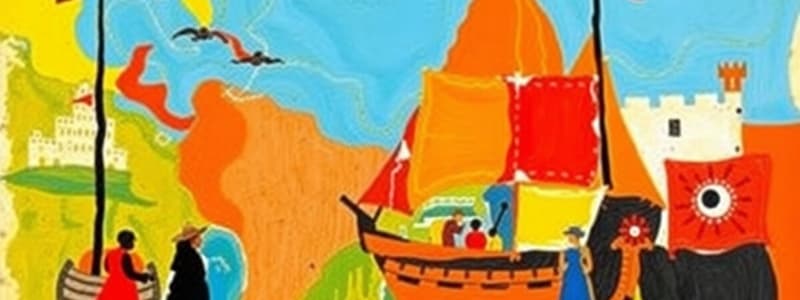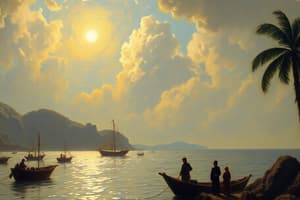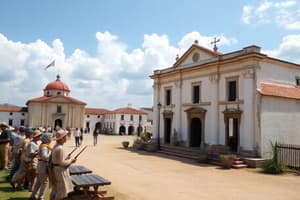Podcast
Questions and Answers
Which city emerged as a new banking/trade center along with Amsterdam?
Which city emerged as a new banking/trade center along with Amsterdam?
- Paris
- Berlin
- Brussels
- London (correct)
What was one of the primary reasons for the increased need for labor in the Spanish colonies after the decline in Native populations?
What was one of the primary reasons for the increased need for labor in the Spanish colonies after the decline in Native populations?
- Rejection of African slaves by natives
- Increased agricultural productivity
- High mortality rate of Europeans
- High yield of silver mines (correct)
Which company was formed during the period of early globalization to facilitate trade and investment?
Which company was formed during the period of early globalization to facilitate trade and investment?
- World Trade Organization
- Federal Reserve System
- International Monetary Fund
- Joint-stock companies (correct)
How many African slaves were brought to Spanish colonies in the Americas between 1595 and 1640?
How many African slaves were brought to Spanish colonies in the Americas between 1595 and 1640?
What agricultural item was significantly introduced and cultivated during the Dutch reclamation of land?
What agricultural item was significantly introduced and cultivated during the Dutch reclamation of land?
What was one of the consequences of early trade networks and improved banking by the mid-1500s?
What was one of the consequences of early trade networks and improved banking by the mid-1500s?
Who was Bartolomeo de las Casas in relation to the treatment of natives?
Who was Bartolomeo de las Casas in relation to the treatment of natives?
Which European country had colonies in North Armenia during the late 1500s?
Which European country had colonies in North Armenia during the late 1500s?
Flashcards
Early Global Trade Expansion
Early Global Trade Expansion
The 16th century witnessed a dramatic expansion of ocean trade routes connecting Europe with the Americas and Asia. This led to the emergence of new trading centers like Amsterdam and London, specializing in banking and trade.
European Colonialism in the Americas
European Colonialism in the Americas
The discovery and exploitation of new lands in the Americas by European powers, particularly Spain, had a profound impact on native populations. While some Europeans believed in incorporating Native Americans into their society, others saw them as inferior and exploited them through forced labor and enslavement.
Encomienda System
Encomienda System
The encomienda system was a legal framework used by the Spanish crown to control Native American labor in their colonial territories. Land was granted to Spanish settlers, who were then obligated to "protect" and convert the Indigenous population to Christianity. In practice, this system often resulted in forced labor, exploitation and abuse.
Transatlantic Slave Trade
Transatlantic Slave Trade
Signup and view all the flashcards
Joint-Stock Companies
Joint-Stock Companies
Signup and view all the flashcards
Financial Innovations
Financial Innovations
Signup and view all the flashcards
Rise of Capitalism
Rise of Capitalism
Signup and view all the flashcards
Early Globalization
Early Globalization
Signup and view all the flashcards
Study Notes
Economic Expansion
- Spanish Galleons: Brought goods from Manila to Mexico, using silver. Used shipping routes from Seville to the Caribbean and Mexico.
- Spanish Empire: Intention to establish an empire. Claimed all land belonged to the Spanish Crown, except for land already owned.
- Natives: Were already present and had their own land claims.
- Encomienda System: Brutally forced Natives into service, like a feudal system.
- 1542: Charles V's "New Laws" : Attempted to end native enslavement, but had little effect because of their desire for labor.
- European Population: Shift from Mediterranean to Atlantic states.
- Colonies: Europeans established colonies in North America (England and France).
- Economic Expansion: Extended trade networks, improved banking, and bills of exchange became common.
- Trading Companies: British and Dutch companies formed in the 1600s representing state interests in overseas trade.
- Hugo Grotius (1609): Proposed ideas about international law and the right of the Dutch to trade in the East Indies.
Agricultural Productivity
- Increased Agricultural Productivity: Crops like tomatoes, bell peppers, and coffee were brought to Europe from the Americas.
- European Population Growth: Increased population growth contributed to the expansion of agriculture, also leading to scale manufacturing and a putting-out/cottage industry.
- Crops: Potatoes and other new crops increased food production.
Price Revolution and Depression
- Price Revolution: Inflation of goods because of the financing of production of goods, storage, exploration, and trade.
- Cost of Living: Significant increase in the prices of everyday goods like wheat and meat across multiple countries.
- Debts: Spanish kings declared bankruptcy and repudiated debts due to inflation and financial burdens.
Role of Merchant Capitalists
- Trading Companies: Allowed merchants to invest and organize overseas trade, capitalizing on the expansion of trade networks.
- Joint-stock Companies: Provided investment capital for the companies, driven by merchants and investors purchasing shares.
- Capitalist Role: Merhcants taking on a more central role in economic activities.
Studying That Suits You
Use AI to generate personalized quizzes and flashcards to suit your learning preferences.
Related Documents
Description
This quiz explores the economic expansion of the Spanish Empire during the colonial period, focusing on trade routes, the encomienda system, and the impact of European population shifts. It also delves into the formation of trading companies and the evolution of international law proposed by Hugo Grotius.




